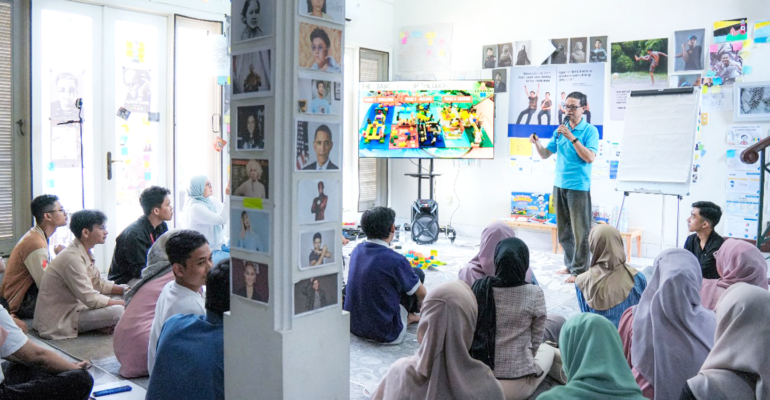IPB University Students Join Lego Training to Increase Self Confidence and Emotional Training

IPB University students who are members of the Pondok Inspirasi social organisation attended a lego training held by Soka Innovation Lab with the title “How to use Lego Toys to become an Honest, Spontaneous Person, and to Have More Self Confident”. The event was held at Jalan Soka Lestari, South Jakarta on Saturday 10/02.
The guest speaker was Bambang Ibenk, who is a lego facilitator, social educator, and stand-up comedian. With his experience and expertise, the man who is often called coach Ibenk provides guidance and motivation for participants to develop self-confidence through lego games as well as material about self confidence, journal dreams and many more.
“Most people may only think of lego as a normal toy, but actually it’s not, through lego we can see a person’s character, whether he is a perfectionist, creative or meticulous type,” said the lego facilitator when delivering preliminary material before starting to play lego.
Coach Ibenk continued that lego game training is an effective method in developing various skills, including self-confidence. He explained that there are three main phases in playing lego, the first is challenge, the second is building and the last is sharing.
“Before starting to assemble, participants are directed to fill out a dream journal, which is to write down three things in themselves that they want to change. In the building phase, participants are invited to assemble legos that can describe the three shortcomings of themselves that they want to change. The last phase is sharing. Participants tell in detail about the lego building and how it relates to their lives,” he said.
The enthusiasm of the participants was high throughout the activity, characterised by the liveliness of all participants in expressing opinions and asking questions.
“This lego game is really fun because it turns out that legos are not just for toys, but we can interpret the meaning of each lego that we arrange,” said Rohimatul Janah, one of the Lego training participants.
Janah continued, besides being able to hone creativity and problem-solving skills, she hopes that this lego training can increase self-confidence and emotional skills for all participants. (*/Lp) (IAAS/RUM)


